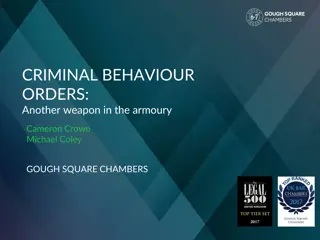Legal Provisions on Admission and Confession in Criminal Proceedings
The content highlights key sections related to admission and confession in criminal proceedings. It defines admission and explains the relevance of inducement, threat, or promise in a confession. It also emphasizes restrictions on confessions made to a police officer. These sections play a crucial role in determining the admissibility and credibility of statements in legal contexts.
Download Presentation

Please find below an Image/Link to download the presentation.
The content on the website is provided AS IS for your information and personal use only. It may not be sold, licensed, or shared on other websites without obtaining consent from the author.If you encounter any issues during the download, it is possible that the publisher has removed the file from their server.
You are allowed to download the files provided on this website for personal or commercial use, subject to the condition that they are used lawfully. All files are the property of their respective owners.
The content on the website is provided AS IS for your information and personal use only. It may not be sold, licensed, or shared on other websites without obtaining consent from the author.
E N D
Presentation Transcript
CHAPTER III GIST OF SECTIONS RELATING TO ADMISSION AND CONFESSION
SECTION 17 Admission defined. An admission is a statement, 1[oral or documentary or contained in electronic form], which suggests any inference as to any fact in issue or relevant fact, and which is made by any of the persons, and under the circumstances, hereinafter mentioned. Comment s Admissibility is substantive evidence of the fact Admissibility is substantive evidence of the fact admitted while a previous statement used to contradict a witness does not become substantive evidence and merely serves the purpose of throwing doubt on the veracity of the witness; Bishwanath Prasad v. Dwarka Prasad, AIR 1974 SC 117.
SECTION 24 Confession caused by inducement, threat or promise, when irrelevant in criminal proceeding. A confession made by an accused person is irrelevant in a criminal proceeding, if the making of the confession appears to the Court to have been caused by any inducement, threat or promise,1 having reference to the charge against the accused person, proceeding from a person in authority and sufficient, in the opinion of the Court, to give the accused person grounds, which would appear to him reasonable, for supposing that by making it he would gain any advantage or avoid any evil of a temporal nature in reference to the proceedings against him.
SECTION 24 A confession made by an accused person is irrelevant in a criminal proceeding, if the making of the confession appears to the Court to have been caused by any inducement, threat or promise,2 having reference to the charge against the accused person, proceeding from a person in authority and sufficient, in the opinion of the Court, to give the accused person grounds, which would appear to him reasonable, for supposing that by making it he would gain any advantage or avoid any evil of a temporal nature in reference to the proceedings against him."
Section 25 Confession to police officer not to be proved. No confession made to a police officer1, shall be proved as against a person accused of any offence. No confession made to a police officer1, shall be proved as against a person accused of any offence."
SECTION 26 Confession by accused while in custody of police not to be proved against him. No confession made by any person whilst he is in the custody of a police officer, unless it be made in the immediate presence of a Magistrate1, shall be proved as against such person. No confession made by any person whilst he is in the custody of a police officer, unless it be made in the immediate presence of a Magistrate2, shall be proved as against such person." 2[Explanation. In this section Magistrate does not include the head of a village discharging magisterial functions in the Presidency of Fort St. George 3[***] or elsewhere, unless such headman is a Magistrate exercising the powers of a Magistrate under the Code of Criminal Procedure, 1882 (10 of 1882)4].
SECTION 27 How much of information received from accused may be proved. Provided that, when any fact is deposed to as discovered in consequence of information received from a person accused of any offence, in the custody of a police officer, so much of such information, whether it amounts to a confession or not, as relates distinctly to the fact thereby discovered, may be proved.
SECTION 28 Confession made after removal of impression caused by inducement, threat or promise relevant. If such a confession as is referred to in section 24 is made after the impression caused by any such inducement, threat or promise has, in the opinion of the Court, been fully removed, it is relevant.
SECTION 29 Confession otherwise relevant not to become irrelevant because of promise of secrecy, etc. If such a confession is otherwise relevant, it does not become irrelevant merely because it was made under a promise of secrecy, or in consequence of a deception practised on the accused person for the purpose of obtaining it, or when he was drunk, or because it was made in answer to questions which he need not have answered, whatever may have been the form of those questions, or because he was not warned that he was not bound to make such confession, and that evidence of it might be given against him.
SECTION 30 Consideration of proved confession affecting person making it and others jointly under trial for same offence. When more persons than one are being tried jointly for the same offence, and a confession made by one of such persons affecting himself and some other of such persons is proved, the Court may take into consideration such confession as against such other person as well as against the person who makes such confession. 1[Explanation. Offence , as used in this section, includes the abetment of, or attempt to commit the offence.] Illustrations
SECTION 30 (a)A and B are jointly tried for the murder of C. It is proved that A said "B and I murdered C . The Court may consider the effect of this confession as against B.
SECTION 30 (b)A is on his trial for the murder of C. There is evidence to show that C was murdered by A and B, and that B said A and I murdered C . This statement may not be taken into consideration by the Court against A, as B is not being jointly tried. COMMENTS Accused's confession cannot be used against co-accused The statement of the accused leading to the discovery, or the informatory statement amounting to confession of the accused, cannot be used against the co- accused with the aid of section 303; Kamal Kishore v. State (Delhi Administration), (1972) 2 Crimes 169 (Del).
CONFESSION V. ADMISSION
CONFESSION V. ADMISSION ADMISSION Section 17 to 23 of the Indian Evidence Act specifically deals with the portions related to admission. As per the section 17 of The Indian Evidence Act, 1872: An admission is a statement, oral or documentary or contained in electronic form, which suggests any inference as to any fact in issue or relevant fact, and which is made by any of the persons, and under the circumstances mentioned in the act.
CONFESSION V. ADMISSION Admissions can be either formal or informal.The formal admission is also called as judicial admission which is made at the time of the judicial proceeding, while the informal admission is those admissions which are made in during the normal day to day activity like in the normal course of life. Formal admission or the judicial admissions are completely admissible by the Court of law under Section 58 of the same act and has much higher probative value into substantive any fact. They are generally rebuttable in nature and require no further proof to disprove the facts admitted in a court of law unless the court asks for the same. ADMISSION WHEN RELEVANT (SEC 18-20)
CONFESSION V. ADMISSION An Admission is relevant if it is made by: 1) A party to the proceeding; 2) An agent authorized by such party. 3) A party suing or being sued in a representative character making admission while holding such character. 4) A person who has a proprietary or pecuniary interest in the subject matter of the suit during the continuance of such interest.
CONFESSION V. ADMISSION 5) A person from whom the parties to the suit have derived their interest in the subject matter of the suit during the continuance of such interest. (Section 18) 6) A person whose position it is necessary to prove in a suit, if such statements would be relevant in a suit brought by against himself (Section 19.) 7) A person to whom a party to the suit has expressly referred for information in reference to a matter in Dispute (Section 20.)
CONFESSION V. ADMISSION EVIDENTIARY VALUE OF ADMISSION An admission is the best evidence against the party making the same unless it is untrue and made under the circumstances, which does not make it binding on him. Admission by a party is substantive evidence of the facts admitted by him. Admissions duly proved are admissible evidence irrespective of whether the party making the admission appeared in the Witness box or not. In fact, Admission is best substantive evidence that an opposite party can rely upon it. The evidentiary value of admission only by government is merely relevant and not conclusive, unless the Party to whom they are made has acted upon and thus altered his detriment.
CONFESSION The term confession is nowhere defined or expressed in the Indian Evidence Act, but the inference explained under the definition of admission in Section 17 of Indian evidence Act also applies to confession in the same manner. Thus, the confession is something which is made by the person who is charged with any criminal offences and such statements conferred by him shall be suggesting a conclusion as to any fact in issue or as to relevant facts. We may also define the confession in other words that the admission by the accused in the criminal proceedings is a confession.
A confession may be of the different type according to the matter of the cases. Broadly confession is differentiated into two different statuses like- when the confession by the means of statements is given itself in the court of law then such confession will be considered as judicial confession, whereas, when the confession by the way of statements is produced at any place other than court then such confession will lead towards extrajudicial confession. CONFESSION WHEN BECOMES IRRELEVANT Sections 24, 25, 26 and relevant part of Section 27 of the Indian Evidence Act, 1872 deals with condition that when can confession be irrelevant.Section 24 of Indian Evidence Act provides that a confession made by a person who is accused of some offence is irrelevant if such confession comes out of any inducement, threat or promise and such instances have proceeded from a person in authority like police, magistrate, court etc .As per section 24 the confession becomes irrelevant:
As a result of inducement, threat or promise; Inducement, etc be made from a person in authority; It should relate to a charge in question; and It should hold out some worldly benefit or advantage.
EVIDENTIARY VALUE Though it is presumed that a person will not make a false statement which can be used against him as evidence, yet confession is considered as a weak type of evidence. Its evidentiary value is very less since there are chances that it can be untrue due to the state of mind of accused or may be influenced by force or under threat etc. Hence, they must be considered in collaboration with other evidence on the record. A court must as a matter of prudence resist from convicting a person solely on the basis of a confession. They must be taken into account in light of the facts and circumstances of the case.
COMPARISON CHART BASIS FOR COMPARISON CONFESSION ADMISSION Confession refers to a formal statement by which the accused admits his guilt of a crime. An admission refers to the acknowledgement of a fact under discussion or a material fact in a lawsuit. Meaning Criminal only Civil or Criminal Proceeding Relevance It must be voluntary to be relevant. It need not be voluntary to be relevant. Possible Not possible Retraction Made by Use Accused Any person It always go against the person making it. It can be used on behalf of the person making it.
ADMISSION CONFESSION If a statement made by a party charged with crime, in criminal proceeding, it is called as a confession The expression Confession means a statement made by an accused admitting his guilt. If a person accused of an offense (accused) makes a statement against him, it is called confession. If a statement is made by a party in civil proceeding it will be called as admission A) The expression Admission means voluntary acknowledgement of the existence or truth of a particular fact B) Confession is the term for admission of guilt made in the criminal side. The Term Admission is applicable to a statement, oral or in writing made by a party on civil side. C) An admission is not conclusive proof of the matters admitted and is always rebuttable. An admission is not conclusive proof of the matters admitted and is always rebuttable. D) An admission may be proved by or behalf of the person making it. But confession always goes against the person making it. E)
While an agent can never make the confession of an offense against a co-defendant. An admission may be made by an agent in course of business. F) Confession made by one or two or more accused jointly tried for the same offense can be taken into consideration against the co- accused. Admission by one of the several defendants in suit is not evidence against other defendants. G) H) Retraction is not possible in Admission. Retraction is possible in Confession. Confession is specie hence all confessions are admissions but all admissions are not confessions. I) Admission is a genus Admission can be either in favor or against the party making it Confession is always against the party making it. J)
Confession Admission No. If a statement is made by a party in civil proceeding it will be called as admission If a statement made by a party charged with crime, in criminal proceeding, it is called as a confession 1) The expression Admission means voluntary acknowledgement of the existence or truth of a particular fact The expression Confession means a statement made by an accused admitting his guilt. If a person accused of an offense (accused) makes a statement against himself, it is called confession. 2) An admission is genius Confession is specie hence all confessions are admissions but all admissions are not confessions. 3) Confession is the term for admission of guilt made in the criminal side. The Term Admission is applicable to a statement, oral or in writing made by a party on civil side. 4)
A confession, if voluntarily and free, may in the discretion of the judge or magistrate, by itself be accepted as conclusive proof of matters confessed and is alone sufficient to warrant a conviction. An admission is not conclusive proof of the matters admitted and is always rebuttable. 5) But confession always goes against the person making it. An admission may be proved by or behalf of the person making it. 6) An admission may be made by an agent in course of business. While an agent can never make the confession of an offense against a co-defendant. 7) Confession made by one or two or more accused jointly tried for the same offense can be taken into consideration against the co-accused. Admission by one of the several defendants in suit is not evidence against other defendants. 8)





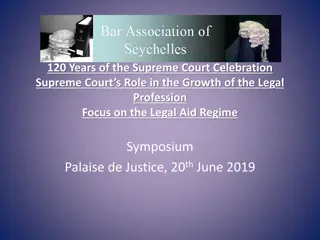
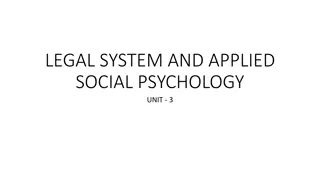



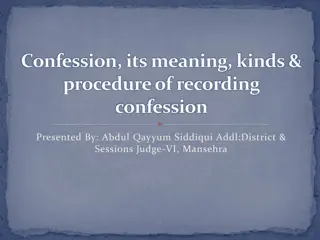
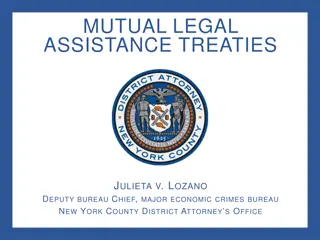
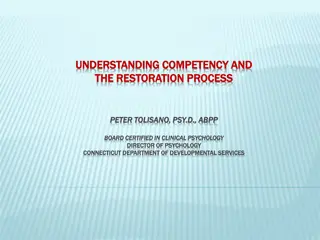
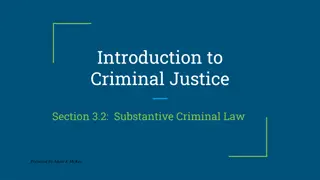
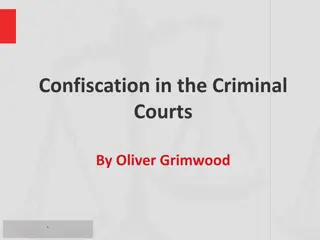
![Briefing on the Criminal Procedure Amendment Bill [B12-2021] to the Portfolio Committee on Justice and Correctional Services](/thumb/157093/briefing-on-the-criminal-procedure-amendment-bill-b12-2021-to-the-portfolio-committee-on-justice-and-correctional-services.jpg)
